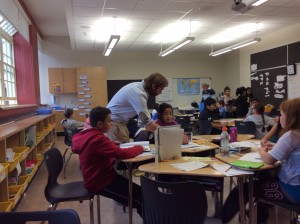First Week Into Practicum
This past week has given me the opportunity to feel totally immersed and involved in a classroom setting. I was able to step out of the observation role and engage with students as their teacher on multiple occasions. I felt the first occasion; a reflection I facilitated on their unit of inquiry was most rewarding. I approached the lesson as if they were the ones with all the knowledge because I hadn’t been at the school for very long, and I asked them what they could share. The students provided me with very responsive feedback, enough for me to see that their unit was effective in its teaching and left them with some interesting facts and experiences. As I walked around the room overseeing them write in their journals, I noticed  some of them had a couple IB learner profile traits within their reflections. It was neat to see all the theory we’ve been doing at UBC put into practice, and the kids understanding and incorporating the learner profile into their working memory.
some of them had a couple IB learner profile traits within their reflections. It was neat to see all the theory we’ve been doing at UBC put into practice, and the kids understanding and incorporating the learner profile into their working memory.
I’m pretty excited to move forward into the next unit of inquiry, simple machines, because I’m going to ask them to be risk takers and thinkers by figuring out how to lift each other using pulleys. Not only will they be thinking critically and exploring new ideas, but they’ll have the opportunity to be outside and moving! It should be a great week, I’ll keep you posted.
Thanks for reading,
Chris

I agree Chris – it is exciting to see the Learner Profile come alive and to see children reflecting on their work through this lens. It is amazing how it easily becomes part of their vernacular at such a young age. Your pulley lesson sounds wonderful and just the right balance of all the things that you enjoy too, especially the outdoor element. I wonder if they will want to use you and your School Advisor as test subjects!
Chris – it looks like you’re really taking what we’ve learned in class and putting into practice. The fact that during the reflection unit you asked the students if they could share and reflect on their knowledge is exactly what I believe inquiry based learning to be –opening the floor to the students, you learning from them and they learning from you. As educators, we owe it to our students to draw on what they already know and help them expand on their current knowledge. I hope the feedback they gave you provided some insight about their learning needs and also helped you when creating your own lesson plan!
I too was also shocked during my own practicum to find out how much of the IB culture is so well integrated in the class as well as curriculum. The students are quite familiar with the terminology and concepts and more importantly, the Learner Profile. I even saw my teacher use the LP outside the classroom, as a model she referenced to when setting expectations about behaviour to her students. I can see you will be integrating the LP in your own lesson plan! Sounds like you have an exciting lesson ahead of you and I hope you were able to reinforce the Learner Profile for your students as well!
Thanks for your post Chris, it was great to read this evening after returning from our much anticipated return visit to our practicum placements today. We are definitely in tune, as I have taken to being critically self reflective about gender neutral language and presenting myself as aspiring to be an inclusive, approachable and holistic teacher. Something I feel is either overlooked or disregarding by some of our male counterparts. I, like many I’m sure, fall victim to the coloqial slang “guys” but as a focus in today’s visit (I was luck to lead two block of teaching today) I made sure that inclusive language, free of gender bias was used at all times. While I cannot say I perceived a definitive reaction from the students, I came home this evening with a feeling of progress, of change, and it felt good. Reminiscent of the inspiring work of Carol Dweck (in her book “Mindset”) we can begin to relize and embrace a growth mindset and take on any challenge we set out to achieve as long as we approach these endeavours with positivity, that ol’ “can do” attitude. For ourselves, and our students, we must embrace the power of the word yet. To not get bogged down in the negatively or frustration but see the possibility in challenge and rigour as one that can make us better indiduals and teachers, and above all reinforce that if we are struggling with anything, known that we just haven’t mastered it…yet!
All the best,
Dave G.